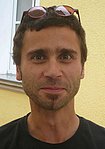
Dr. Lars Fredrik Stöcker
Assoziiert am Institute for Russian and Eurasian Studies (IRES), Universität Uppsala
Research interests
Central and East European history, Scandinavian history, Cold War, history of Communism, socialist economies, history of transformation, political opposition in state socialist regimes
Ongoing projects
Book project "Laboratories of Marketization: A Historical Reassessment of Economic Reforms at the Soviet Union's Western Fringes, 1987-1991"
Selected publications
2018. Bridging the Baltic Sea: Networks of Resistance and Opposition during the Cold War Era. Harvard Cold War Studies Book Series, ed. Mark Kramer. Lanham, MD: Lexington Books.
2017. "The 1972 Memorandum to the United Nations and Its Repercussions: Émigré Politics and Soviet Estonian Dissent during the 'Era of Stagnation'". Journal of Baltic Studies 48 (2): 109-33.
2016. "Perestroika and the Economic 'Westernization' of the USSR: Soviet Estonian Market Pioneers and their Nordic Partners". Estonian Historical Journal 3-4: 447-76.
2015. "Cracks in the 'Iron Curtain': The Evolution of Political Contacts between Soviet Estonia and the Estonian Emigration in Sweden before Perestroika". Baltic Worlds 8 (1-2): 75-85.
2014. "Nylon Stockings and Samizdat: The 'White Ship' between Helsinki and Tallinn in the Light of Its Unintended Economic and Political Consequences". Zeitschrift für Ostmitteleuropaforschung 63 (3): 374-98.
2013. "The Baltic Connection: Transnational Samizdat Networks between Émigrés in Sweden and the Democratic Opposition in Poland", in Samizdat, Tamizdat & Beyond: Transnational Media during and after Socialism, eds. Friederike Kind-Kóvacs and Jessie Labov. New York and Oxford: Berghahn Books, 51-69.

PD Dr. Olaf Terpitz
Assoziiert am Zentrum Jüdische Studien Berlin-Brandenburg (ZJS)
Research interests
Russian literature and culture
Jewish literatures and cultures in Eastern Europe
European-Jewish encounters
Literary and cultural theories
Language culture, history of knowledge, translation
On-going projects
Editorship: translation of Shimon An-Ski's First World War Memories from Yiddish into German "der yidisher khurbm fun poyln, galistye un bukovine (fun tog-bukh 5674-5677 (1914-1917)"
Selected Publications
Monograph "Russische Sprachkultur von Juden (1800-1930). Zwischen Imperium und Nation" ("Russian Jewish Language Culture between Empire and Nation") (In Vorbereitung)
Die Rückkehr des Štetl. Russisch-jüdische Literatur der späten Sowjetzeit, Göttingen: Vandenhoeck & Ruprecht; Schriften des Simon-Dubnow-Instituts IX, 2008.
Jüdische Räume und Topographien in Ost(mittel)europa. Konstruktionen in Literatur und Kultur (zusammen mit Klavdia Smola), Harrassowitz Verlag, Reihe „Opera Slavica“, Wiesbaden 2014.
Alois Woldan, Olaf Terpitz (Hg.), Ivan Franko und die jüdische Frage in Galizien. Interkulturelle Begegnungen und Dynamiken im Schaffen des ukrainischen Schriftstellers, Vienna University Press bei Vandenhoeck & Ruprecht, Göttingen 2016.
Mitherausgeber (mit Petra Ernst), Schriften des Centrums für Jüdische Studien Graz/ Reihe Literatur und Sprache, Studienverlag.
Between Russendisko and the Yid Peninsula: The Concepts of Art and Lebenswelt in the Work of Wladimir Kaminer and Oleg Iur’ev. In: Leo Baeck Institute Year Book 2005 (L): 289-298.
“Zwischen den Zeiten”. Russisch-jüdische Schriftsteller in Deutschland. In: Schoenborn, Susanne (Hg.). Zwischen Erinnerung und Neubeginn. Zur Deutsch-Jüdischen Geschichte nach 1945. München 2006, 232-249.
Berlin als Ort der Vermittlung. Simon Dubnow und seine Übersetzer. In: Gertrud Pickhan & Verena Dohrn (Hg.) Transit und Transformation. Osteuropäisch-jüdische Migranten in Berlin, 1918-1939. Göttingen 2010, 114-135.
Shtetl-Metaphern. Projektionen in der russisch-jüdischen Literatur seit den 1970er Jahren. In: Petra Ernst & Gerald Lamprecht (Hg.) Jewish Spaces. Die Kategorie Raum im Kontext kultureller Identitäten. Innsbruck/Wien/Bozen 2010, 253-272.
Europa? Suchbewegungen russisch-jüdischer Schriftsteller. In: Barbara Breysach, Alfred Bodenheimer (Hg.) Abschied von Europa. Jüdisches Schreiben zwischen 1930-1950. München 2011, 105-122.
Babi Jar. In: Enzyklopädie jüdischer Geschichte und Kultur. Band 1. Hg. Dan Diner. Stuttgart: Metzler 2011, 226-230.
Assimilljacija ili stolknovenie kul’tur? Plutovskij èlement v “Zapiskach evreja” G. Bogrova i “Burnoj žizni Lazika Rojtšvaneca” I. Èrenburga. In: Kornelija Ičin & Helena Tolstoy (eds.) Judaica Rossica – Rossica Judaica. Belgrad 2011, 161-175.
An Enclave in Time? Russian Jewish Berlin Revisited. In: Peter Wagstaff, Jörg Schulte & Olga Tabachnikova (eds.) The Russian Jewish Diaspora and European Culture (1917-1937). Leiden/Boston: Brill 2012, 179-199.
(zusammen mit Susanne Marten-Finnis) Sprachmittlung und Migration. Zur Vorläufigkeit translatorischer Diskurse. Zwei Momentaufnahmen aus Berlin und Warschau (1919-1929), in: Kalverkämper, Hartwig/ Larisa Schippel (Hg.): „Vom Altern der Texte“. Bausteine für eine Geschichte des interkulturellen Wissenstransfers, Berlin 2012, 321-351.
Transformation and persistence of the past. Russia and the new home in the work of Olga Beshenkovskaia (Germany) and Anna Fajn (Israel). In: Julia Lerner & Rivka Feldhay (eds). „Russians“ in Israel. The Pragmatics of Culture in Migration. Tel Aviv: The Van Leer Jerusalem Institute and Hakibbutz Hameuhad, 2013, 407-419 [Hebrew].
Migration und Wissenstransfer. Überlegungen zu Intellektuellen aus Ost(mittel)europa in Deutschland (1860-1914). In: Brigitta E. Gantner & Péter Varga (Hg.) „Transfer – Interdisziplinär!“ Akteure, Topographien und Praxen des Wissenstransfers. Frankfurt/Main et al.: Peter Lang, 2013, 63-77.
Lev Levanda, Sholem Aleichem und Antoni Słonimski. Die Stadt und das Feuilleton. Vermessung der Zeit und Strategien der Literarisierung. In: Klavdia Smola/ Olaf Terpitz (Hg.) Jüdische Räume und Topographien in Ost(mittel)europa. Konstruktionen in Literatur und Kultur. Wiesbaden: Harrassowitz Verlag, 2014, 1-21.
Vom Rande Europas. Betrachtungen zur Performativität von Zugehörigkeit im Schreiben und Habitus von Lev Nussimbaum. In: Jahrbuch der Gesellschaft für europäisch-jüdische Literaturstudien 1, Hg. von Petra Ernst, Berlin: de Gruyter, 2014, 216-235.
Sprachkulturelle Transformationen im Russländischen Reich des 19. Jahrhunderts. Vermittlungen des Literarischen und Sakralen durch Lev Binštok und Lev Mandel’štam. In: Rafael Arnold (Hg.) Jüdische Übersetzer als Akteure interkultureller Transformationen. [Universitätsverlag Winter Heidelberg; erscheint 2015].

Dr. Patrice Dabrowski
Research interests
nation-building and nationalism
identity formation
festivals and commemorations
borderland and regional studies
history of tourism and environmental history
use and abuse of the past in East Central Europe
Selected Publications
Poland: The First Thousand Years (DeKalb, IL: Northern Illinois University Press; 2014).
Commemorations and the Shaping of Modern Poland (Bloomington and Indianapolis: Indiana University Press, 2004).
(with Stefan Troebst) Von Gebrauch und Missbrauch der Historie: Geschichtspolitik und Erinnerungskulturen in Ostmittel- und Südosteuropa (1791-1989) (Working Paper Series, Global and European Studies Institute at the University of Leipzig, 7) (Leipzig: Leipziger Universitätsverlag, 2014).
“Encountering Poland’s ‘Wild West’: Tourism in the Bieszczady Mountains under Socialism,” in Socialist Escapes: Breaks from the Everyday in Cold War Eastern Europe, ed. Cathleen Giustino, Catherine Plum, and Alexander Vari (New York and Oxford: Berghahn Press, 2013), 75-97.
“Borderland Encounters in the Carpathian Mountains and Their Impact on Identity Formation,” in Shatterzone of Empires: Coexistence and Violence in the German, Habsburg, Russian, and Ottoman Empires, ed. Omer Bartov and Eric D. Weitz (Bloomington and Indianapolis: Indiana University Press, 2013), 193-208.
“’Equal to the Kings’? Viewing Wawel Burials of the Interwar Period,” Centropa 12, no. 1 (January 2012): 4-19.
“Uses and Abuses of the Polish Past by Józef Piłsudski and Roman Dmowski,” The Polish Review 56 (2011), nos. 1-2: 73-109.
“Commemorations and the National Revitalization of Kraków,” ece-urban - the online publication series of the Center for Urban History of East Central Europe, no. 2 (2008); also published online in Polish (as “Obchody i narodowa rewitalizacja Krakowa”) and Ukrainian (as “Narodni sviatkuvannia ta natsional’ne vidrodzhennia Krakova”). English version available at http://www.lvivcenter.org/download.php?newsid=1070&fileno=2.
“Constructing a Polish Landscape: The Example of the Carpathian Frontier,” Austrian History Yearbook 39 (2008): 1-21. Article awarded the R. John Rath Article Prize for 2008.
“’Medicis for the Fatherland’? Artists and Cracow, 1879-1910,” East Central Europe/L'Europe du Centre Est. Eine wissenschaftliche Zeitschrift (ECE) 33, no. 1-2 (2006): 33-54.
“‘Discovering’ the Galician Borderlands: The Case of the Eastern Carpathians,” Slavic Review, 64, no. 2 (Summer 2005): 380-402. Article awarded the inaugural Biennial Article Prize (now known as the Aquila Polonica Prize) of the Polish Studies Association, 2007.
Ehemalige Postdocs
Das DK dankt seinen weiteren ehemaligen PostdoktorandInnen:
Ljiljana Radonic war Postdoktorandin und Koordinatorin des DK von 2009-2013. Nähere Informationen zu ihrer Person und ihren Forschungsinteressen finden sich auf ihrer Website.
Börries Kuzmany war mit dem DK lange Jahre inhaltlich und institutionell verbunden. Nähere Informationen zu seiner Person und seinen Forschungsinteressen finden sich auf seiner Website.
Campus der Universität Wien
Spitalgasse 2, Hof 1.11
A-1090 Wien




